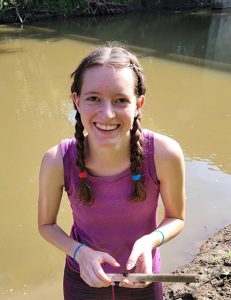
Ten undergraduates were supported by Kansas NSF EPSCoR last summer to conduct research at four universities across the state.
Their projects were all different but related in some way to microbes—the tiny life forms that are too small to see without a microscope but live virtually everywhere.
Studying microbial communities, known as microbiomes, in Kansas ecosystems is the focus of the current Kansas NSF EPSCoR initiative. The scientific team seeks to learn how microbiomes function in soil, water, and plants. Undergraduates play a key role in advancing the research.
The students gained more than just research skills. Most of them have presented, or plan to present, their results at conferences. They also forged collaborations, made lifelong friends, and found inspiration to pursue advanced degrees and careers in science.
The 2021 Kansas NSF EPSCoR undergraduate researchers are listed below by host institution.
Fort Hays State University
- Matthew Tannis, Fort Hays State University, “Impact of commercially available microbiome additives on growth and reproduction of a native warm season grass;” mentor: Mitchell Greer, associate professor of biological sciences at Fort Hays State University
Kansas State University
- Faith Atkinson, West Texas A&M University, “Measuring changes in soil macroporosity on Konza Prairie associated with woody encroachment;” mentor: Jesse Nippert, professor of biology at Kansas State University
- Brandon Clark, Emporia State University, “Richness in diversity of plant fungi on plant samples from five field stations;” mentor: Ari Jumpponen, professor of biology at Kansas State University
- Diana Diaz, Florida Gulf Coast University, “Land-use effects on aquatic microbial diversity and nutrient limitation;” mentor: Lydia Zeglin, associate professor of biology at Kansas State University; Diana’s summer research story
- Lane Lundeen, Kansas State University, “Hydrology methods and influence of land use on stream geomorpology;” mentor: Walter Dodds, distinguished professor of biology at Kansas State University
- Shelby Richard, Kansas State University; mentor: Charles Rice, distinguished professor of soil microbiology at Kansas State University
University of Kansas
- Riddi Duvvur, University of Kansas, “”Redox buffer capacities of sandy and clay soils;” Mentor: Terrance Loecke, associate scientist at the Kansas Biological Survey and associate professor of environmental studies at the University of Kansas
- Hannah Nuest, University of Kansas, “Fungi and Bacteria on the Edges of Kansas Rivers;” mentored by Benjamin Sikes, associate professor of ecology and evolutionary biology at the University of Kansas; Hannah’s summer research story
- Hannah Reid, University of Kansas, “Identifying fungal root endophytes of drought-stressed grasses;” mentored by Maggie Wagner, assistant professor of ecology and evolutionary biology at the University of Kansas; Hannah’s summer research story
Wichita State University
- Justin Oettle, Wichita State University, “Effects of drying-rewetting history of 64 outdoor cattle tanks and vertebrate assemblage on water column nutrient dynamics;” mentor: Thomas Luhring, assistant professor of biological sciences at Wichita State University; Justin’s summer research story
What is Kansas NSF EPSCoR? So much more than an acronym!
As a long-running research engine, Kansas NSF EPSCoR serves to equip, empower, and elevate scientific research for the state. The acronym stands for National Science Foundation (NSF) Established Program to Stimulate Competitive Research (EPSCoR). NSF uses EPSCoR to level the playing field for states and U.S. territories whose scientists receive a lower percentage of federal support. Learn more.
